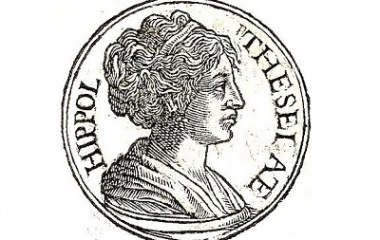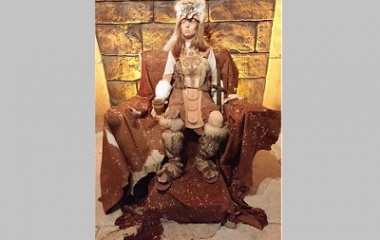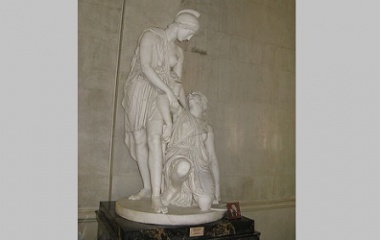- Pronunciation: Hi-pol-i-tuh
- Origin: Greek
- Location: Scythia
- Role: Mortal, queen
- Symbols: Magical girdle
- Spouse: Theseus (possibly)
- Children: Hippolytus
Who is Hippolyta?
A fierce race of female warriors, known as the Amazons, participated in the Trojan War and played a role in the labors and battles of the gods and the mortal children of Zeus. Hippolyta was their leader, and the strongest and wisest of the Amazons.
Origin
The Amazons were the descendants of Ares, God of War. They were well known for their courage, strength, and pride, even to the furthest limits of the known world at the time. Ares gave Hippolyta a gift of a magical belt that would grant her the title of Queen of the Amazons in the city of Themiskyra, near the Black Sea. In time, the Amazons found themselves, through their queen Hippolyta, involved in conflicts with Heracles, Theseus, and Bellerophon.
Family
Zeus and Hera brought Ares into the world, and he became the God of War. While the exact origin of the Amazons is not known, what is known is that they are associated with Ares, and that Hippolyta found favor in Ares’ eyes as his daughter. Her race formed an independent kingdom and her influence spread to several outlying cities and towns. The intermarriage of Amazons and men from other tribes was allowed, but any male children born were often killed, sent back to their fathers, or left to fend for themselves in the wilderness. The family of Hippolyta, therefore, consisted mostly of women of her own tribe, who accepted her as their leader.
History
Hippolyta was involved in several important battles and trials, the most well known of all involving Heracles and Theseus.
The 9th Labor of Heracles
Heracles, in a fit of madness caused by Hera, had slain his own children. His crimes would not go unpunished, and in order to be purified, he was given a series of tasks to perform. One of his tasks was to retrieve the belt of Ares from Hippolyta.
The belt didn’t seem to be spectacular – at first glance it seemed like nothing more than an intricately carved leather belt – but it held magical properties that were granted to Hippolyta as she wore it. It also represented her authority over her people, much in the same way that a crown signified a king’s power.
Hippolyta was informed by her warriors that a ship had appeared on the horizon. The Amazons had never had visitors to their homeland before, and both she and her people were curious about these newcomers to their lands. The ship moored at the dock, and out emerged a magnificent warrior who seemed to have an unnatural, godlike strength to him. His name was Heracles, and he asked to meet with her in private, to be away from the possible influence of Hera, who harbored such vindictive passions towards him. Hippolyta agreed to meet with Heracles upon the ship.
In the candlelight, Hippolyta listened, concealing her pity and feelings, to Heracles’ story. Heracles never intended to be born from the union of Zeus and Alcemene, never intended to cause so much anger and grief to Hera, Zeus’ wife. But he had been tormented by Hera and driven to madness, for the simple crime of existing as the son of Zeus. In his insanity, he had murdered his beloved wife and all of his children. She tried to hold back her tears and couldn’t. Heracles did understand the full horror of his crimes, and was willing to atone for them. King Eurystheus had given him a set of 10 tasks to complete, one of which was to retrieve the cherished belt she had been given as a child by Ares. Heracles had endured so many trials before this one, including slaying or capturing several powerful creatures. He did not want to cause her or her people harm, and knew that she had to make the choice to give him the belt and could only hope he had been persuasive enough with his honesty to Hippolyta.
Hippolyta was torn, because she knew what the belt symbolized to herself as well as to her people. But she was not heartless, and felt great pity, compassion and sorrow upon hearing Heracles’ account of what had happened. Reluctantly, Hippolyta agreed to give him the belt so that he could finish this 9th task. But although they met in secret, Hera still managed to learn about what had transpired between Hippolyta and Heracles.
Hera was not pleased at all. She had been trying to foil and curse Heracles at every opportunity for years. She disguised herself as an Amazon warrior, and told the other Amazons that Heracles had tricked them and would kidnap Hippolyta. Furious and enraged, they swarmed upon the ship ready for battle. Hippolyta didn’t understand what had happened and tried to calm her people, but they were too angered to listen. Heracles knew that he didn’t have much time before his ship would be completely overrun. He kissed Hippolyta lightly on the cheek, gently lifted her onto the dock, and with the belt in his grasp, set sail… leaving Hippolyta to ponder her decision to give up her treasured belt.
Theseus and the Conflict of the Amazons and Athenians
A long time had passed since the last visit of strange men to her home. Upon the shores of her kingdom, Hippolyta stood with a small company of her female guards once again. She would be meeting with Theseus, a mortal man who was rumored to have slain the minotaur. As the ship came into view, she had mixed feelings about the whole affair. The last time someone had visited her shores, she had lost the magical belt that had been given to her by Ares. Well, she thought… maybe ‘lost’ wasn’t the best way to put it. She did have sympathy for Heracles, and did after all agree to give it to him. Despite what happened later on that night with her warriors’ attack and Heracles’ sudden departure, Hippolyta had her honor and her word was her bond.
A strong and beautiful woman, Hippolyta remained hopeful that no harm would come to her people from this meeting. She brought gifts, and held a great feast in honor of her guests with all of the Amazons attending and celebrating with wine, music, food, and dancing.
The next morning, Hippolyta boarded the Athenian ship with the best of intentions and met with Theseus. At first, it seemed that the two would be able to work together harmoniously. Theseus became enamored with her, finding her lovely and a possible perfect bride for himself. Without thinking, he proposed that they unite in marriage, and pledged to make her the queen of Athens, with all of the glory and riches the title would bring. But Hippolyta didn’t welcome this idea. She had an obligation to her own people, the Amazons, as well as her own responsibilities. Although flattered, she refused his offer. As she walked away, she did not hear the whispers of Theseus and his crew, nor was she aware that the ship had left the docks.
As soon as the ship set sail and was no longer within sight of the shores of the Amazon’s homeland, Theseus immediately claimed Hippolyta as his bride, stealing her away and hoisting the sails for a swifter journey to Athens.
Word of the kidnapping reached Queen Hippolyta’s Amazons, who were infuriated at this brazen act of treachery. They gathered in great numbers and stealthily set sail for Athens in their own ships, in pursuit of those who were forcing their queen into marriage. Theseus had begun planning a massive celebration and festival in honor of his wedding, unaware of the battle plans that were brewing across the sea.
The Amazon women were seasoned warriors and knew that their best hope of rescuing their queen would be launching their attack at night. They planned out their attack on the rocky ground at the camp in Attica. As the people slept in their beds, the Amazons arrived in the darkness and at once mounted an attack on Theseus’ palace. They only had until dawn, when the wedding would take place, and managed to rescue Hippolyta just in time. That morning, Theseus awoke and waited for his bride to appear as the great wedding celebration began, but he would wait in vain. Hippolyta had been spirited away back to her homeland, where she and her people would become ever more cautious and wary of visitors in the future.
Current Influence
Hippolyta and her people would conduct raids in Anatolia, and became synonymous with the concept of the female warrior. It is believed that her people invented the concept of the cavalry, and they were heard of by great kings and rulers such as Alexander and Eurystheus.
To this day, Hippolyta and the Amazons continue to be represented in song, art, literature, plays, television shows and comic books.










